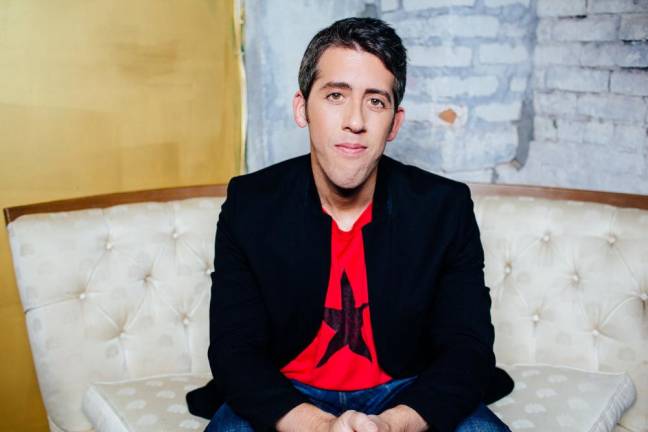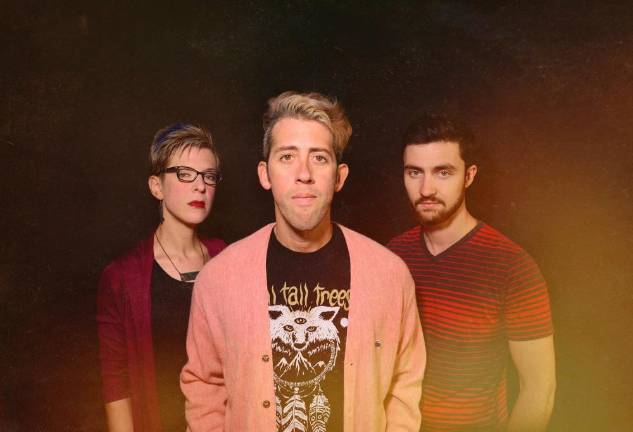Joe Brent is making it his mission to help fellow musicians have “artistic and financial agency over their music.” In 2021, the Queens native, who grew up in Tampa, Florida, started a record label called Adhyâropa with a system that is fairer for artists when it comes to earning revenue from their music.
“Everybody knows that streaming doesn’t pay artists very well, but I think people don’t have a sense of how bad it actually is and how bad it’s gotten,” he said.
Brent, 48, who lives in Washington Heights, originally created the label for his “activist band,” 9 Horses, where he plays “mandolin and then also guitar, violin, piano and lots of other things.” As fate would have it, his friend was releasing a record at the same time and signed on with Brent’s label and “that’s the last time I ever reached out to anyone.” The word spread through word of mouth and now the label is about to release its 90th album.
Brent’s path to becoming a professional musician includes attending Berklee College of Music in Boston and even traveling to Italy to study with a virtuoso mandolin player there. Once he returned to New York, he made his solo debut at Carnegie Hall and landed a chair on Broadway. Most recently, he was the mandolin player in the revival of Oklahoma. He’s also published two books on mandolin pedagogy, “only read by the very coolest people with lots to do on the weekends, but who choose to play mandolin instead.”
On June 7th, 9 Horses released its 4th album, Strum, which he said can be described as “cinematic.” “We all have both a jazz and a classical background and play a lot of different kinds of music, and it’s all in there.”
Tell us how you started playing the mandolin.
I started on the violin, because I saw Itzhak Perlman on TV. There were always instruments laying around like guitars, domras and balalaikas and stuff because I come from a big Russian family. So I was always playing a lot of other stuff too and studying violin when I was young. Then in my teens is when I really decided that guitar and mandolin were closer to my real voice and eventually it just became the mandolin as the primary thing.
Explain your educational background and path to becoming a professional musician.
I first went to DePauw University to study composition because I really wanted to be a composer. And I was studying with a teacher there who I really liked. But I wasn’t the most focused student, so after three semesters there, I was invited not to return. Let’s just say I had a bit of a substance abuse problem back then as well. So I went down to Georgia and played in a band there for a year, which didn’t help with the substance abuse, but it gave me something to do for a little while. And then I was, “Ok, that’s it. I have to clean myself up.” And I went back and finished my degree at Berklee College in Boston in ‘99.
When did you move to New York?
I was living in the city in ‘99. I had done a couple of gigs at the end of my undergrad where I had some songwriting credit on some really big songs so I was able to get a really nice apartment as a very young man on Cedar Street, directly across from the South Tower of the Trade Center. So I was only there for a little while and then on 9/11, I had to move. That place just didn’t exist anymore. I was going to Rutgers for my master’s at the time, didn’t finish, because I had already gotten a lot of work playing off-Broadway shows and stuff.
The masters I was getting was in jazz history and I really enjoyed it, but I just wasn’t able to put my full energy into it because I was working so much. So I went to Italy for a little while and studied with a teacher out there named Carlo Aonzo, who’s a really incredible virtuoso mandolin player. And I was there off and on for a couple of years and came back and have been in New York City ever since, except for a few years when I lived in Beacon.
When did you make your Broadway debut?
Well, I could give two different answers to that. One was many, many years ago. There was a Broadway version of the movie Urban Cowboy, and I was the sub for the violin book [chair]. And the show came out and it got just really dreadful reviews and so the main violinist just left the show, he had some work in Europe, I believe. And so essentially that became my show until the end of the run.
You founded the band 9 Horses. Who else is in the group?
At the core of it is myself on mandolin and then also guitar, violin, piano and lots of other things. And then violinist Sara Caswell, whose full name is actually Grammy-nominee Sara Caswell. She was the first woman ever nominated in the Grammy category of Best Improvised Solo, which had existed for 60 years. And then bass player Andrew Ryan. Andrew and I are Grammy-adjacent, we’re not Grammy nominees.
We collaborate with lots and lots of people, so on the album that’s coming out right now, there are 25 other guest musicians on the record. On the one that we did a few years ago, there’s something like 40. But when we tour, it’s usually just the three of us doing reduced versions of all the tunes.
Explain the state of the music industry.
It used to be, back when I was a kid, when you sold a record, a certain percentage of that went to the artist or a songwriter, a certain percentage went to the label, and a certain percentage went to the distributor. That was a system that worked pretty much for a long time.
I don’t think people realize that Spotify pays something like a third of a cent per streaming at the most. So you really have to make a lot of streams to make any kind of money whatsoever.
Apple Music is slightly better than that, but the only way you’re gonna make any money off of streaming is to get on playlists. And Apple is not going to consider your music for playlists unless it’s mastered in Dolby Atmos [surround sound technology]. But who has at home a 15-speaker setup where they can record and master in Dolby Atmos?
Everything that’s happened in my lifetime has been very bad for artists and the reason why it’s gotten that way is because we’re not organized in the way that other genres are. If you look at the actors and the writers, they went on strike last year and got a lot of what they wanted. The guy playing a corpse on CSI is in the same union as George Clooney and Julia Roberts and I share nothing with Bad Bunny and Taylor Swift.
To learn more, visit www.josephbrent.com

